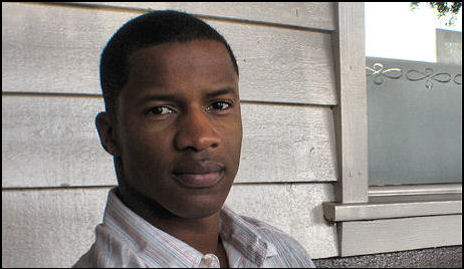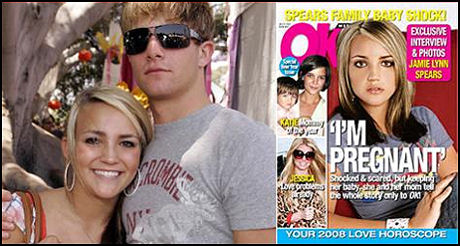Of all the Xmas presidential front-runner ads, I have to admit that Hilary Clinton‘s is a tiny bit craftier — idea, production values, acting (i.e., lines that don’t demand too much emoting), no “C” word — than Barack Obama‘s, although Barack’s is certainly warmer and more comforting.
Fincher on story permutations
“There’s this whole school of thought that movies are always so great when you’re 10 or 12 years old, and the reality of it is, when you’re 10 or 12 years old, you’ve only seen 100 stories. By the time you get to be 25, you’ve seen 3,000. You’ve seen every permutation of every dramatic arc. And when somebody takes that and stands it on its head, that can be exciting.” — Zodiac director David Fincher to Variety‘s Justin Chang.
Spears’ parenting book cancelled
“Lynne Spears‘ book about parenting has been delayed indefinitely, her publisher said Wednesday. Lindsey Nobles, a spokeswoman for Christian book publisher Thomas Nelson Inc., said that the memoir by the mother of Britney Spears was put on hold last week. She declined to comment on whether the delay was connected to the revelation that Spears’ 16-year-old daughter, Jamie Lynn, is pregnant.”
“Vulture” synchronicity
It’s comforting to read that New York‘s “Vulture” column shares at least some of my advance loathing for Peter Jackson‘s two Hobbit movies (“So, uh, great — the sequel’s going to be some Silmarillion- inspired filler crap, like all those scenes of Aragorn and Arwen pitching woo at each other, except not written by Jackson? Count us out.”) And also that they’ve picked up on my thought about Juno‘s Oscar chances possibly being affected by the real-life pregnancy of 16 year-old Jamie Lynn Spears and…uhm, Lily Allen.
Henry Lowe’s fate
I’ve noticed an interesting difference between a late work-print version of Denzel Washington‘s The Great Debaters that I saw a few weeks ago and the release- print version that I saw last night at Harvard University. It’s a big change regarding the fate of Nate Parker‘s Henry Lowe character — the most charismatic and gifted Wiley College debater, although one with an occasional weakness for booze and women.

Nate Parker, snapped during a West Hollywood HE interview in late November
In the work-print version of the epilogue crawl (i.e., the what-happened-to-the- characters info that fact-based dramas often supply), it said that after graduating Lowe simply disappeared — an indication that he may have succumbed to his addictions, etc. It seemed like an interesting call since inspirational films usually pass along uplifting information, blah blah. Lowe is a composite character (i.e., not based on a specific real-life figure) so Washington was free to write any fate he chose. Saying that Lowe didn’t build upon the potential of his early life was, at the very least, against the grain and admirable for that.
But this dark-fate decision, apparently, didn’t go down with research audiences. In the final-release version, it is said that Lowe went into the ministry — an obvious hint that he turned to God and the cloth as a way of controlling his demons. A more upbeat and positive fate, yes, but an indication of a certain artistic flexibility on Washington’s part. This is a small thing I’m mentioning. The Great Debaters is still sharply written, forthright, not sappy, well-shaped. It’s “commercial” and likely to catch on. (Probably.) It’s just that conveying Lowe’s downbeat fate added an interesting counter-shade.
The good-looking Parker gives the most vivid performance in The Great Debaters. He comes off as confident, centered…settled into himself. The guy most likely to get a bounce off this film, I’m betting.
The only real-life, history-based debater in the film is James Farmer, Jr. (Denzel Whitaker), who went on in real life to found the Congress of Racial Equality and become a major civil-rights movement leader.
Tom Hanks & My Space page
Tom Hanks was on Regis and Kelly this morning, plugging Charlie Wilson’s War. At some point during the shpiel he mentioned his My Space page, and how he’s often (or at least occasionally) zinged by readers with “screw you, dirtbag” or “eat my ass, Tom” or thoughts along these lines. A friend who saw the segment said that Hanks then said, in cleaned-up TV talk show-ese, “You know what? Fuck these people.” This was the gist, apparently. Maybe the episode will turn up on YouTube.
Lay off Diablo Cody
There is nothing in the least bit inappropriate or off-putting in the way Juno screenwriter Diablo Cody has promoted herself. She’s not doing anything Quentin Tarantino didn’t do (or try to do) 13, 14, 15 years ago. “I’m not just a writer but a smart-ass character/celebrity who knows about getting attention and working the town every which way”…no big deal & totally par for the course by 21st Century hype standards. You have to synch with the ongoing scale and velocity of things as they are, not as you might want them to be.

It therefore seems to me as if L.A. Times columnist Mark Olsen is exaggerating by saying Juno‘s rep may be in jeopardy because of the Cody hype “overwhelming its very genuine strengths.” He’s also noted that “more than one internet wag has wondered if Cody’s new gig as roving columnist for Entertainment Weekly will be her Norbit-style Waterloo.” Bullshit…the analogy isn’t there.
That said, if you’re taping a talk show it’s impolite not to turn your cell phone off. I’m not saying any more than this.
Fernandez on “different race”
Scriptland columnist Jay Fernandez has passed along one of the best explanations or theories about why there’s so little understanding and commnication between WGA negotiators and those repping the studios and producers. The latter, he’s saying, are basically a “different race” who have nothing in common with the creative community because they’re basically corporate pod people.
In other words, Fernandez has drawn posted an interesting analogy between the mentality of producer/suit strike negotiators and the “condescending paternalism of the Bush administration…a business and political culture that increasingly seeks to disenfranchise [writers] from having a say in huge decisions about their industry’s future, and thus a measure of control over their own professional identities and livelihoods.
“‘Trust us,’ the companies seem to be saying in a dismissive echo of Bush policy, ‘we know what’s best for you.’
“As one producer with a studio deal joked, Louis B. Mayer and Harry Cohn famously treated the writers like bothersome children too, but at least they were children from the same family. These days, vertical integration has forced a mercenary corporate culture down through the very human ranks of studios and networks that used to be filled with actual movie and TV lovers.
“Now it’s as if the top executive ranks are a different race — brutal bean counters, not simpatico cinema dreamers — who don’t even know how to speak to their creative personnel, let alone make decisions based on their sense of fairness.”
16 year-old pregnancy trend
The reaction to 16 year-old Jamie Lynn Spears, Britney’s younger sister and star of Nickleodoen’s Zoey 101, announcing she’s pregnant and keeping the baby can be summed up as “what…?” (As if it was possible to be appalled by Spears family shenanigans.) But this is the third major entertainment-industry indicator that 16 year-old pregnancies aren’t that weird, which obviously telegraphs to teenage girls that it’s at least…you know, an option.

There’s Juno, of course — the Jason Reitman/Diablo Cody dramedy about a 16 year-old (Ellen Page) who can’t go ahead with an abortion after getting pregnant. Speaking for the filmmakers, Page’s Juno realizes from the get-go that she’s way too young to try and raise the child so she finds a yuppie couple looking to adopt. But the film is obliquely saying it’s not altogether terrible for a 16 year-old to go through 40 weeks of child-carrying. Juno matures, gets in touch with her identity and emotions. It’s not a good or advisable thing, Reitman and Cody are saying, but not 100% bad either.
And of course, Whale Rider star and Oscar nominee Keisha Castle Hughes got pregnant last year at age 16. Her daughter was born last April.
The 16 year-old Spears has told OK magazine that the father is Casey Aldridge, who she has been dating for some time and first met at church.
“Shine a LIght” doc
The Set List, edited by Variety associate editor Phil Gallo, announced yesterday that Apple has posted the first trailer for Martin Scorsese‘s Shine a Light (Paramount, 4.8.08), the delayed Rolling Stones concert doc. This trailer was up last August, guys. I posted an item about it on 8.25.

“Control” at Regency Fairfax
Jeff Sneider, the AICN/Variety guy, took a group of friends to see Control at “the decrepit” Regency Fairfax on Beverly Blvd. last Sunday night, and was treated to a projection nightmare of classic proportions. Here’s his story:

“We get through the commercials and trailers but then I don’t see The Weinstein Company logo (newly changed to TWC at Monday night’s Great Debaters screening) or the funky Northsee logo. The movie starts snd the credits roll, and it’s suddenly apparent that the black-and-white Control has been upgraded to color and that Paul Schrader is the new director. In short, the projectionist had begun to show The Walker.
“So I ran out, convinced it was my mistake for walking into the wrong theater and desperate not to miss the opening minutes of Control. I check the other two theaters at that venue and by the time I storm back up the ramp to yell at management, the entire theater full of angry Joy Division fans in the original theatre had filed out. Management comes out to apologize. It’s not the end of the world, they say, but then they can’t just put the movie back on immediately.
“So we have to sit through another 20 minutes of commercials and trailers including that dreadful ad for the National Guard featuring a 3 Doors Down song that’s so bad, the only thing I can do to keep my ears from bleeding is to keep reminding myself that soon enough, we’ll be listening to Bowie, the Sex Pistols and Joy Division for two hours.
“So we sit through the same trailers more or less (is TWC really banking on their acquisition of Under the Same Moon?) before the film starts. All my friends are miserable at this point. We get out of the 9:40 pm screening around 12:15 am. And here’s the kicker. All four of them (all white, aged 22-25, in the industry and of the high thread-count variety) hated the movie. They thought Sam Riley gave a very good performance in a terrible, drab, and worst of all, boring film. I was in absolute disbelief and I’m still shocked that they failed to see the inherit brilliance of Anton Corbjin‘s directorial debut.
“What can I say? There’s no accounting for taste.”
Wells to Sneider: Start shopping around for a more evolved class of friends. You say these guys are high thread-counters (i.e., a euphemism that alludes to refined taste) and in the industry, but they’ve obviously got a ways to go in their ability to recognize high-end filmmaking so…I don’t know, something doesn’t calculate. Control is one of the year’s absolute finest — there’s no debating that whatsoever unless you’re Robert Koehler. You certainly can’t say it sucks outright — that’s out. It sounds harsh to put it this way, but they’re probably just not perceptive enough.
You can still call these guys and meet up for drinks now and then, but the writing on the wall is saying that you need to think about hooking up with a better class of social allies who might wonder in their heart of hearts if you’re hip enough for them to hang out with. Always “relationship” in an upward or lateral direction — never downward.
No waiver for AMPAS
Just to be clear: while the Writers Guild of America West announced Monday it has blocked the Hollywood Foreign Press Association from using guild writers on its Golden Globes award show next month, and said “no” to the Academy of Motion Picture Arts and Sciences about using current and historical film clips on its Academy Awards broadcast, the Academy has for whatever reason not requested a waiver for using guild writers on the 2.24.08 Oscar show.
They should spare themselves the effort. In a 12.19 N.Y. Times story on the matter by David Carr and Michael Ceiply, it is reported that WGA chiefs directors have “already decided they [will] not grant a waiver for writers, including the prospective host Jon Stewart, to work on the show.
A guild spokesman told the Times on Tuesday that “the union planned to have picket lines around the Globes ceremony in Beverly Hills, Calif., set for broadcast on 1.13.08 on NBC, potentially leading to empty seats where there should be Hollywood royalty. He said the union had not yet decided whether to picket the Oscars.
“With those moves, Hollywood√ɬ¢√¢‚Äö¬¨√¢‚Äû¬¢s most cherished movie awards shows could lose much of their star power, viewers, advertising revenue and cachet,” the Times story explains. “Suddenly, the film industry is looking at its first real damage from a six-week-old writers√ɬ¢√¢‚Äö¬¨√¢‚Äû¬¢ strike that has mostly been chewing up the television schedule.
√ɬ¢√¢‚Äö¬¨√Ö‚ÄúWe were surprised to meet opposition at this early stage,√ɬ¢√¢‚Äö¬¨√Ǭù said AMPAS executive director Bruce Davis. “We thought we√ɬ¢√¢‚Äö¬¨√¢‚Äû¬¢d be Switzerland.√ɬ¢√¢‚Äö¬¨√Ǭù

